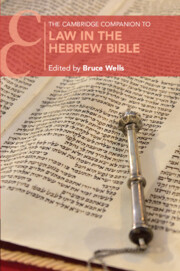Book contents
- The Cambridge Companion to Law in the Hebrew Bible
- Cambridge Companions to Religion
- The Cambridge Companion to Law in the Hebrew Bible
- Copyright page
- Contents
- Contributors
- Abbreviations
- Introduction
- Part I The Historical Context of Biblical Law
- Part II The Biblical Legal Collections
- Part III The Biblical Laws
- Part IV Biblical Law and Other Scriptural Discourses
- Part V The Legacy of Biblical Law
- 12 Biblical Law and the Dead Sea Scrolls
- 13 Biblical Law and the New Testament
- 14 Biblical Law and Rabbinic Literature
- 15 Biblical Law and Early Christian Interpretation
- Bibliography
- Subject Index
- Text Index
- Cambridge Companions To Religion (continued from page iii)
- References
14 - Biblical Law and Rabbinic Literature
from Part V - The Legacy of Biblical Law
Published online by Cambridge University Press: 11 April 2024
- The Cambridge Companion to Law in the Hebrew Bible
- Cambridge Companions to Religion
- The Cambridge Companion to Law in the Hebrew Bible
- Copyright page
- Contents
- Contributors
- Abbreviations
- Introduction
- Part I The Historical Context of Biblical Law
- Part II The Biblical Legal Collections
- Part III The Biblical Laws
- Part IV Biblical Law and Other Scriptural Discourses
- Part V The Legacy of Biblical Law
- 12 Biblical Law and the Dead Sea Scrolls
- 13 Biblical Law and the New Testament
- 14 Biblical Law and Rabbinic Literature
- 15 Biblical Law and Early Christian Interpretation
- Bibliography
- Subject Index
- Text Index
- Cambridge Companions To Religion (continued from page iii)
- References
Summary
This chapter covers rabbinic interpretations of biblical law and the different hermeneutical strategies used by the rabbis in these efforts. Rabbinic law in some cases can circumvent biblical law and in others demand greater attention and consequence than its scriptural counterpart.
- Type
- Chapter
- Information
- The Cambridge Companion to Law in the Hebrew Bible , pp. 283 - 299Publisher: Cambridge University PressPrint publication year: 2024



